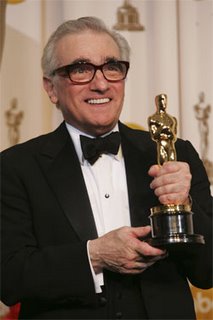 Last night, Martin Scorsese claimed his long-deserved Oscar for Best Director. He received it for THE DEPARTED, which also won Best Picture, Best Screenplay (William Monahan), and Best Editing (Thelma Schoonmaker). The Academy of Motion Picture Arts & Sciences has a long history of either failing to recognize true excellence or to honor the best of its practitioners in any kind of contemporary fashion, but THE DEPARTED is one of Scorsese's finest pictures -- ambitious in scope and detail, fiercely well-acted, and remarkably dense in its cynicism. Its two-and-a-half hours present us with a world in which there is no clearly delineated good and evil, just a hopelessly compromised bureaucratic world in which good things can sometimes happen, if only at the whim of corrupt people. Described by Scorsese as his first movie with a plot, THE DEPARTED has a particularly impressive structure -- and, as remarkable as the film itself may be, speaking as a writer, I have the feeling that William Monahan's screenplay was perhaps the more quantum achievement; it's an amazing piece of writing.
Last night, Martin Scorsese claimed his long-deserved Oscar for Best Director. He received it for THE DEPARTED, which also won Best Picture, Best Screenplay (William Monahan), and Best Editing (Thelma Schoonmaker). The Academy of Motion Picture Arts & Sciences has a long history of either failing to recognize true excellence or to honor the best of its practitioners in any kind of contemporary fashion, but THE DEPARTED is one of Scorsese's finest pictures -- ambitious in scope and detail, fiercely well-acted, and remarkably dense in its cynicism. Its two-and-a-half hours present us with a world in which there is no clearly delineated good and evil, just a hopelessly compromised bureaucratic world in which good things can sometimes happen, if only at the whim of corrupt people. Described by Scorsese as his first movie with a plot, THE DEPARTED has a particularly impressive structure -- and, as remarkable as the film itself may be, speaking as a writer, I have the feeling that William Monahan's screenplay was perhaps the more quantum achievement; it's an amazing piece of writing.Seeing Scorsese finally win the Oscar -- and to have it presented to him by Francis Ford Coppola, George Lucas and Steven Spielberg, a veritable three-headed lion of contemporary American cinema -- was one of many moments of requital that made last night's Academy Awards broadcast perhaps the most personally meaningful I'd seen. He didn't direct it, but Scorsese and his editor Thelma Schoonmaker were largely responsible for the quality of WOODSTOCK, which remains one of the finest documentaries ever and a turning point in cinema history. When I saw MEAN STREETS for the first time, at the Skywalk Cinemas in Cincinnati in 1973, I had the feeling that I was hearing my own generation speak to me through a motion picture narrative for the first time. TAXI DRIVER, of course, is a masterpiece of apocalyptic power. RAGING BULL and GOODFELLAS -- inarguably, two of the greatest American films of their century. I'm not saying anything here that hasn't been said many times before, nor am I even scratching the surface of all he's given us, but these are the principal reasons why it was so invigorating to see his greatness properly recognized -- these, plus the fact that his moment was reserved for a time when he clearly wasn't being awarded simply for being himself, when the award was attached to a work that is in no way a minor addition to his filmography.
I was just as happy to see Helen Mirren's magnificent work recognized, but I was also delighted by the approach taken by the show's producers this year, honoring not only the winners but all the nominees. While the trophy itself is obviously something to envy, it's one's fellow nominees who provide the true measure of one's accomplishment in these categories, and I would imagine that the real honor -- to any artist -- would be to be considered, for example, part of the Academy Awards' "Class of 2007" in whatever category.
My only disappointments this year were related to PAN'S LABYRINTH: why no Best Achievement in Visual Effects nomination? I haven't seen THE LIVES OF OTHERS, so I can't say that Guillermo del Toro was robbed in the Best Foreign Film category, particularly as he was the first audience member to hug the victor, but I do feel that his film wasn't quite paid the full measure of respect it was due... undoubtedly because the Academy has an allergy to fantastic cinema.
Despite this, I found the 79th annual Academy Awards to be something it rarely is: heartening. This year, it was actually about movies that I care about.